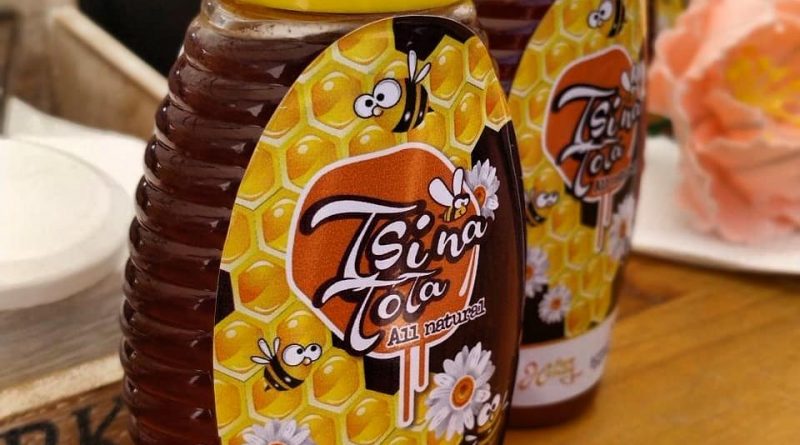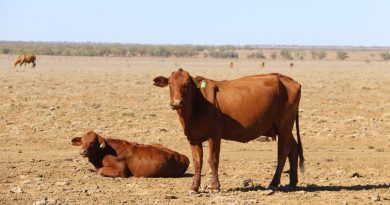Successful honeybee farming
In 2017, Botswana imported 95 tons of honey, with South Africa providing 77% and Zambia responsible for the remaining 23%. The honey was worth $519 000, which is well over P5million. Othata Mokgwathi, one of the directors of Tsina Tota, a local organic honey production company, explains to Rocky Gofamodimo that despite the many challenges faced by the local bee farming industry, they aim to stake a claim in this lucrative market.
Tsina Tota basically started in 2010 by Bokani Swartz, Othata’s business partner with 4 hives in their backyard, and because of the noise and other issues that affected the hives, they were moved to a farm in Notwane, on the outskirts of the capital city, Gaborone. From the original 4 hives, the company now have over 100 .
“We do everything from taking care of the bees, planting flowers for them, extracting the honey etc” Explains Othata.
According to him, while the company was officially started in 2010, they started commercially producing honey roughly two years back.
” We got inspired to try this when we attended a youth expo some few years back.” Say Othata as he explains what motivated them to join the apiculture industry.
He goes on to explain that it wasn’t easy at first. They basically operated on a trial and error basis and learnt what to do or not to do as they went along.
Process
” We harvest twice a year, just before winter, around May, and we harvest again in December. so we give them the time to make the honey.” Says Othata
From harvesting they take the honey comb and we put it in the honey press, which basically squeezes the honey. From there they filter the honey to remove impurities such as pollen. After that they bottle it and it’s ready for the market.
“We have tested our honey at NAFTEC and the food control lab. we passed all the tests. We don’t take anything out except for impurities. we give our clients raw, natural honey” He explains.
Challenges
Land and equipment
Our main challenge currently is lack of land. We have bees we need land.
We need more land in order to increase our hives. Finding consistent supplies is also a challenge as Tsina Tota gets most of their equipment from other countries. This include glass jars and the bottles.
” If we get land we will build our own workshop at the farm so that we make our own equipment.”
Personal development
From a personal perspective there is the issue of personal development, learning as much as we can about bees, finding new ways to get more out of them sustainably.
Pests
Another issue is pests. But according to Othata, pests are part and parcel of farming.
And while they do there are a few of them, they still pose a challenge. “there is a beetle that gets in the hives and plants itself in the honey combs, lays eggs and multiplies from there.” He says. There is also a moth, which starts out as a silk worm, it kills the bees and eats the honey comb. ” Finally, there is a bee pirate, it’s almost like a wasp, it comes out mostly when it rains, and attacks the bees.” Explains Othata.
Othata says that a couple of months ago they had a problem with a honey badger for the very first time. ” It was the first time ever and there was nothing we can do as it is one of the animals protected under the Wildlife act and policies. We just had to take the loss. ” He says with a heavy heart.
All in all Othata believes that in bee farming just like in any other business, you win some and you lose some, and one just has to be vigilant, check the boxes consistently, make sure they are clean to ensure that there are no aliens in the hives.
Markets
Even though Tsina Tota produces 3tons of honey annually, they have found penetrating the market challenging, this is despite the fact the country has been importing roughly 90 tons of honey annually. This has forced the company to work market penetration strategies to take their honey to Batswana. Part of the strategy includes attending conferences, expos and shows.
” Currently we sell directly to consumers and we are still negotiating with retailers.” Explains Othata. He says that they used to be in Choppies stores and hope to get back on their shelves after clearing a few minor issues. They will soon be selling through Woolworths as they have done all the necessary tests on the honey are happy with it. ” As soon as we finish other logistics we should be able to supply them. ” He elaborates.
According to Othata, the retailers want consistent supply of a quality product that meets their standards, so they also want to make sure that they meet their side of the bargain.
He goes on to explain that the problem with retailers is that because they dont pay upfront, when a supplier’s product is packaged in glass, falls and breaks, the supplier bears the cost.
“Which explains why we have a range of both glass and plastic packaged honey.”
From a sales perspective, Honey consumption is basically seasonal as there are times when sales are slow. This is the case especially during summer. The sales pick during winter mostly because Batswana associate honey with medication for flu and other cold remedies.
Certification
“We are in the process of getting organic certification. Our current challenge is finance as this certification comes at a steep cost. The problem is the guys have to come from South Africa to Botswana as there are no bodies that does it locally. ” Ecplains Othata.
While the Food Lab and NAFTEC tests does help, Othata believes the organic certification is what Tsina Tota really needs.
Final word
It takes patience, persistence. You just have to keep working, sometimes you’ll feel like your endeavors are all in vain but I’ll you shouldn’t despair as eventually you’ll get there. Bees are very temperamental. A slightest mistake can make them leave. You got sleep with all you hives occupied and the next morning half of them are empty because the bees decided overnight to “relocate”. So you just have to know and love your bees passionately. Understand them. Treat them nicely. It takes time to grow and be successful. some from 3-5 years before you can even break even. so patience is the key.
” After extracting honey we are left with the wax. We are currently looking to expand our business and get into cosmetics such as lotions, lip balms, candles ” Concludes Othata



